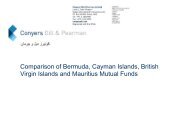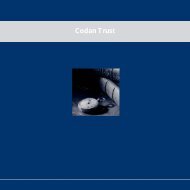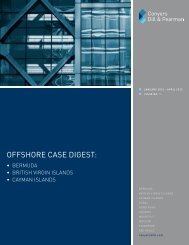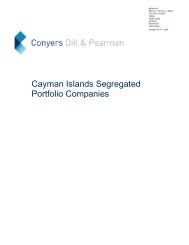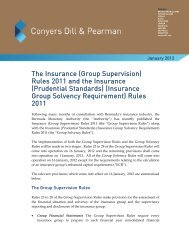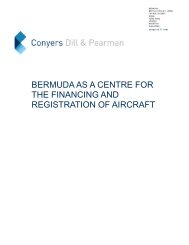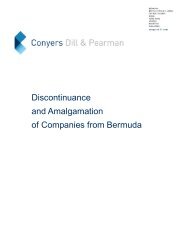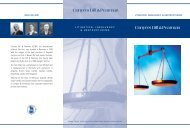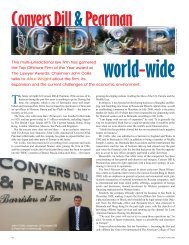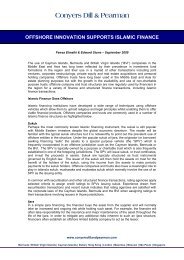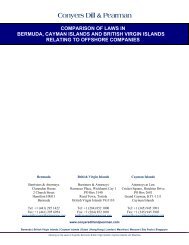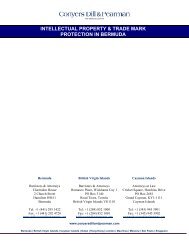OFFSHORE CASE DIGEST: - Conyers Dill & Pearman
OFFSHORE CASE DIGEST: - Conyers Dill & Pearman
OFFSHORE CASE DIGEST: - Conyers Dill & Pearman
You also want an ePaper? Increase the reach of your titles
YUMPU automatically turns print PDFs into web optimized ePapers that Google loves.
CAYMAN ISLANDSCONTRACT – CONSTRUCTION – CLAWBACKAGREEMENTEnnismore Fund Management Limited v. Fenris ConsultingLimited, Grand Court of the Cayman Islands FinancialServices Division, Cause No FSD 65 of 2009, per Foster, J.(7 February 2012)The Plaintiff is an investment management company and theDefendant is a consultancy company set up to provide fundmanagement services to the Plaintiff. The compensationagreement between the two parties was based on a systemof bonuses which would be subject to claw back in respectof losses attributable to the relevant portfolios, a system thatwas memorialized in a badly drafted claw back agreementprepared by a non-lawyer. After catastrophic losses in thefinancial crisis, the Plaintiff brought an action on the clawback agreement which required the Court to determine itstrue meaning and construction and in particular whether, as amatter of interpretation, claw back was based upon and limitedto the amount of reduction in the overall performance fee or onthe individual performance of the portfolios managed by theDefendant. Further, the Court was required to determine themeaning of the words, ‘attributable to’ in the context of the clawback agreement.The Court held that an agreement must be interpreted in lightof all the background circumstances reasonably known by oravailable to the parties, which includes absolutely anythingwhich would affect the way in which the language of thedocument would have been understood by the reasonableperson having all such background knowledge. It is alsoappropriate in interpreting such an agreement that the Courtshould know and take account of the commercial purpose ofthe agreement, which itself presupposes knowledge of thegenesis of the transaction, the background, the context, andthe market in which the parties were operating. The poorerthe quality of the drafting, the less weight should be given tosemantic niceties that attribute to the parties an improbable andunbusinesslike intention. Having regard to these principles, theoperation of claw back under the agreement was based uponand related to the individual performance of the Defendant inthe management of the particular portfolios for which it wasresponsible and the profits and losses on those portfolios.Furthermore, while in some circumstances, “attributable to”may well require that the Court consider the notion of blameor fault, in this case, based on the overall construction of thecontract, there is no inference to that effect to be drawn fromthe agreement. Here, “attributable to” means only that theinvestments in question were part of the Defendant’s portfolio.Judgment was given for the Plaintiff.COMPANIES – WINDING UP – LOSS OF SUBSTRATUM –INJUNCTION TO RESTRAIN DISPOSAL OF SHARESIn the Matter of the Companies Law (2011 Revision) and Inthe Matter of Merchantbridge Managers Inc. Grand Courtof the Cayman Islands Financial Services Division, CauseNo. FSD 5 of 12, per Smellie C.J. (9 February 2012)The respondent company, which is the management ofcompany of an investment consortium, was characterizedas a quasi-partnership between four persons. Two of thefounders were killed in an air accident and one of them wassubsequently bought out by the other. The family members ofone of the deceased participants were appointed to the boardof the company by the sole surviving shareholder, directorand partner of the group, and they promptly removed himfrom the board. With the removal of the last remaining activeparticipant in the management company, it is alleged that thecompany had been effectively paralyzed, as there was no oneleft with the capacity to carry on its functions and as a resultthe substratum of the company has failed. The Applicant filed(but has not yet served) a petition to wind up the company. TheApplicant immediately brought an ex parte application for aninjunction to prevent the board of the company from removinghim as a director of nine special purpose vehicles which arethe investment holding companies of the consortium. He alsosought an injunction to restrain the management company fromdisposing of its shares in the holding company through whichconyersdill.com • 22



